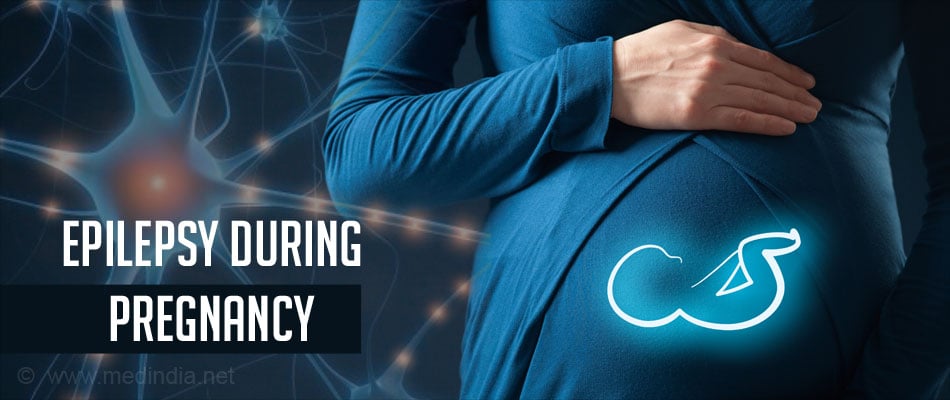- Katz O, Levy A, Wiznitzer A, Sheiner E. Pregnancy and perinatal outcome in epileptic women: a population-based study. J Matern Fetal Neonatal Med. 2006 Jan. 19(1):21-5.
- Laganà AS, Triolo O, D''Amico V, Cartella SM, Sofo V, Salmeri FM, et al. Management of women with epilepsy: from preconception to post-partum. Arch Gynecol Obstet. 2016 Mar. 293 (3):493-503
- Fried S, Kozer E, Nulman I, Einarson TR, Koren G. Malformation rates in children of women with untreated epilepsy: a meta-analysis. Drug Saf. 2004. 27(3):197-202.
- Hernández-Díaz S, Smith CR, Shen A, Mittendorf R, Hauser WA, Yerby M, et al. Comparative safety of antiepileptic drugs during pregnancy. Neurology. 2012 May 22. 78(21):1692-1699.
Pregnancy and Epilepsy
Pregnancy is an extremely sensitive and delicate phase in a woman’s life requiring utmost care and attention. While numerous medical conditions can affect the mother during pregnancy, conditions like epilepsy and hypertension can prove to be fatal for both the mother and the baby if not immediately attended to by an expert healthcare professional.
Here’s a complete review of why epilepsy during pregnancy happens and how it can be treated.

What is Epilepsy?
Epilepsy is a common neurological disorder where there is a disturbance in the nerve cell activity of the brain causing convulsions or seizures and loss of consciousness, along with abnormal electrical activity in the brain. The hallmark of this disease is its recurrence and chronic nature.
Seizures can affect one’s daily life including work, and personal relationships. They can originate after a brain injury, stroke, Alzheimer’s disease or due to a familial tendency, though often the cause is idiopathic i.e. unknown. Almost 65 million people around the globe are affected by epilepsy, of which 6 out of 10 have epilepsy due to an unknown cause.
Treatment options are plenty once an accurate diagnosis is made. Drugs form the mainstay of treatment followed by other methods. There is no permanent cure; however, the intensity, severity and complications of this neurological disorder can be effectively managed with medical supervision.
Epilepsy during Pregnancy
The combination of epilepsy and pregnancy is extremely risky; however, most women who have epilepsy during pregnancy can deliver healthy babies just like a normal pregnancy. Epilepsy or seizures are a common occurrence in women of the reproductive age affecting approximately 600,000 people in the UK.
Since pregnancy itself is an emotional and physical change, the added stress can lead to an aggravation of episodes of seizure in these women. The concern is the increased risk of fetal malformations, miscarriage i.e. abortion and perinatal death.
What Causes Seizures during Pregnancy?
Pregnancy itself does not lead to seizures. Usually, women who already have had seizures prior to pregnancy have repeated episodes. This may be because drugs do not work optimally during pregnancy and the woman might need higher dosages. Also, women who have severe nausea and vomiting during pregnancy may end up vomiting all the medicines. Occasionally, some women have convulsions for the first time during pregnancy.
Factors such as hormonal changes, water retention and stress are known triggers for seizures.
Labor can increase stress in a woman affecting overall health. Other contributing factors which can trigger a seizure include:
- Hyperventilation (rapid or deep breathing)
- Missed medications
- Sleep deprivation

What are the Risks Associated with Epilepsy during Pregnancy?
Convulsions during pregnancy pose a risk to both the mother and the child. The severity of the risk depends on the type of seizure - partial or generalized.
Partial seizures carry lesser risk in comparison to generalized seizures; however, partial seizure can lead to generalized seizures.
Risks associated with seizure disorder during pregnancy are:
- Trauma due to fall
- Increased tendency for premature labor
- Miscarriage
- Decreased heart rate of fetus
- Preterm birth
There are some risks associated with anti-epileptic medications too and include birth defects or deformities. The most common malformations include cleft lip and cleft palate, neural tube defects, spina bifida and heart abnormalities. However, the risks associated with seizures during pregnancy are much higher than risks due to usage of anti-epileptic medications.
What are the Symptoms of Epilepsy during Pregnancy?
Seizures can either be partial or generalized type. Generalized seizures affect both the parts of the brain. They thereby affect the whole body leading to loss of consciousness and falling down while having an episode. Partial seizures affect only a small part of the brain and produce symptoms in the body part which is controlled by the affected brain area. Differentiation between both types of seizures is important as treatment for both is different.
In addition to convulsions, other symptoms include:
- Headache
- Changes in the mood
- Fainting and falling down
- Confusion and dizziness
- Memory loss
- Tongue biting
- Absent and repeated blinking of eyes, licking lips in absence seizures
- Nausea and vomiting

What are the Complications of Epilepsy during Pregnancy?
Both epilepsy and its medications affect the mother and the developing fetus during the entire period of gestation. While most women have a successful pregnancy, there are certain risks associated with epilepsy during pregnancy. These include:
- Hypertension
- Stillbirth
- Generalized seizures associated with loss of consciousness and violent jerky movements can lead to trauma or fall, or a reduced oxygen supply to fetus, which could lead to preterm labor or birth
- Small baby
- Neural tube defects
- Reduced absorption of vitamin D in the body leading to lowered levels of vitamin D
- Severe bleeding in the newborn baby due to low levels of vitamin K
- Babies can show withdrawal symptoms following birth due to the sudden stoppage of exposure of anti-epileptics from the mother during pregnancy
- Breastfed babies may have sleeping issues and may feel sleepy or drowsy. However, the advantages of breast feeding outweigh the side effects of anti-epileptics
How is Epilepsy during Pregnancy Treated?
The key to a successful pregnancy and a healthy baby are timely monitoring and management which not only includes prenatal care, but also post-natal care.
Women with seizure disorders must visit their doctor more often during pregnancy. Medications given to prevent seizures will be strictly monitored to avoid any unnecessary complication or side effects. The least possible medicines in their smallest doses are prescribed and it is always recommended not to discontinue them unless specified by your healthcare provider.
About 2-3% of pregnancies may develop fetal malformations due to the use of anti-epileptic medications. A careful evaluation needs to be done before the woman plans her pregnancy to choose the right drug for every patient. Valproic acid and lamotrigine are highly effective drugs in epilepsy.

However, valproate used during first 28 days of pregnancy carries a risk of 1-2% of congenital malformations in the baby. Studies show that children of women who have taken valproic acid during pregnancy have a lower IQ or have an increased risk of developing autism. Single drug therapy is a safer option for treatment. The newer drugs available are better tolerated and are much safer during pregnancy.
Your obstetrician will discuss the entire plan for your care during pregnancy. If required, a neurologist will also be included for your routine checkups. Ultrasound scans need to be performed more often to monitor development of your baby. Blood tests must be done to monitor levels of anti-epileptics in the blood. Genetic counseling should be done to understand the risk of your baby inheriting epilepsy.
If you are on anti-epileptics, it is recommended to take 5 milligrams of folic acid every day. Preconception folic acid is also advised for women who have epilepsy and are trying to conceive.
The risk of seizures during labor is very low; however, it is recommended to plan your baby’s birth in a well-equipped maternity unit hospital. Vitamin K injection will be given to your baby immediately after birth.
Avoid smoking cigarettes, drinking alcohol and excess caffeine intake during pregnancy.
There is no reason not to breastfeed the baby, unless specified by your consultant. However, it is best to discuss the benefits of nursing with your doctor while on anti-convulsants.







